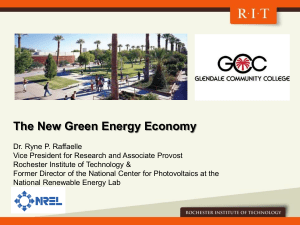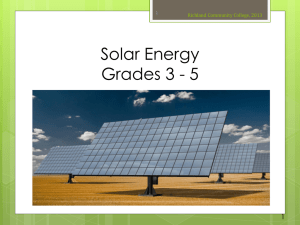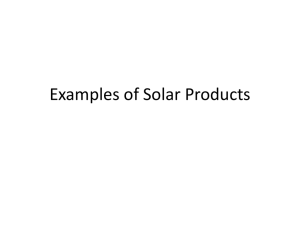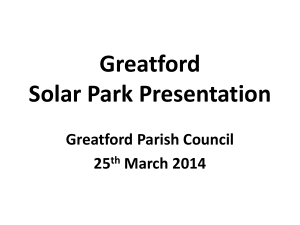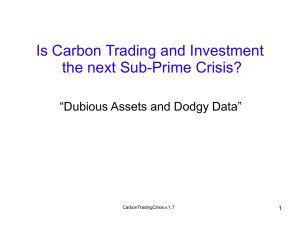PowerPoint - Climate Conferences
advertisement
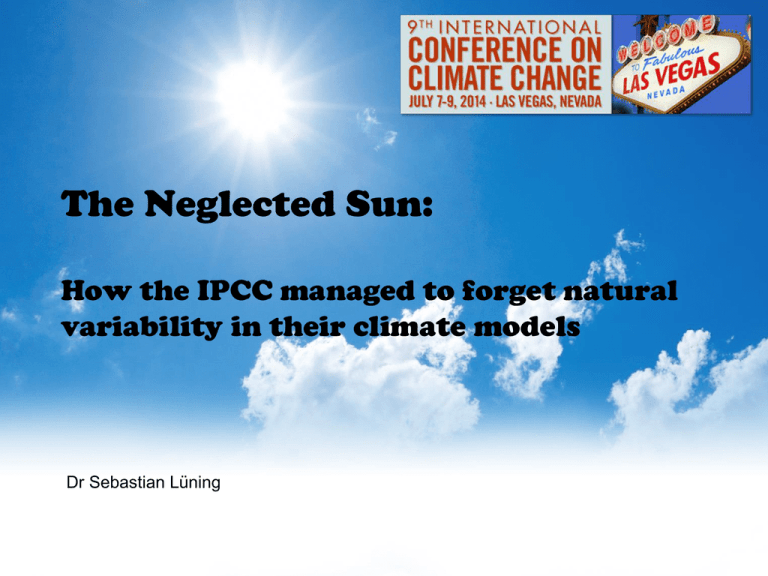
The Neglected Sun: How the IPCC managed to forget natural variability in their climate models Dr Sebastian Lüning Our Sun • 99.98 percent of the total energy contribution to the Earth’s climate originates from the sun • It appears plausible that small changes in solar output may have major climatic consequences on Earth The 11 Year Solar Cycle: The Shortest of all Cycles Reconstruction of Solar Activity of the Past Steinhilber et al. 2012 • Solar activity reconstructed via cosmic rays as recorded by 10Be in ice core records from Greenland and Antarctica and global 14C tree ring records Frequency Analysis of Holocene Solar Activity Data • Data: Solanki et al. 2004 • Analysis from Kern et al. 2012 87 210 1.000 Cycle Duration Hallstatt Eddy 22 Suess/de Vries Hale 11 Gleissberg Schwabe Overview of Solar Cycle Types 2.300 Years Hallstatt (2300 years) and Eddy (1000 years) Cycles “Our wavelet analysis identifies fundamental solar modes at 2300-yr (Hallstattzeit), 1000-yr (Eddy), and 500-yr (unnamed) periodicities” Claim in IPCC 2013 (AR5): Hardly any climate effect of the sun > Radiative forcing according to IPCC AR4: – CO2: 1.66 W/m2 – Sun: 0,12 W/m2 > Sun has hardly any climatic significance in the IPCC models BUT: Geological and historical data show significant influence of climate by solar activity. How to solve the enigma? ScienceDirect: 22,683 hits when searching for „solar forcing“ Papers are usually reported on only in skeptics blogs, not by mainstream media Blogs Club du Soleil by Maarten Blaauw (Queen's Univ. Belfast): Overview of new papers on solar-climate interaction “Surprising“ Findings in Steinhilber et al. 2012: Steinhilber et al. 2012 • Comparison of solar activity (blue curve) and Asian climate records (green curve, delta 18O of stalagmites in Chinese cave) reveals generally good fit Junginger et al. 2014 From abstract: Rapidly decreasing water levels of up to 90 m over less than a hundred years are best explained by changes in solar irradiation either reducing the East African–Indian atmospheric pressure gradient and preventing the CAB from reaching the study area, or reducing the overall humidity in the atmosphere, or a combination of both these effects. […] the water-level record from the Suguta Valley demonstrates the importance of both orbitally-controlled insolation variations and short-term changes in solar irradiation as factors affecting the significant water level variations in East African rift lakes. Moffa-Sánchez et al. 2014 Ogurtsov & Oinonen 2014 How much has the planet warmed up in the last 150 years? http://zpolitics.com/global-warming-slumber-party/ Global Warming of the 20th Century: 0.8°C What was the reason for this warming? Increase of Temperature, CO2 and Solar Activity Temperature > Besides temperature and CO2 also solar activity has increased over the past 150 years. > The solar magnetic field has more than doubled. CO2 Sun Solar activity of the past decades was one of the highest over the past 10.000 years Solanki et al. 2004 (nature): 17 Has the planet been heating up to unprecedented levels? http://www.buzzle.com/articles/whats-the-difference-between-climate-change-and-global-warming.html Greenland Temperature reconstruction for the past 5,000 years based on deuterium in ice cores Carter 2008 Rennaissance of the Medieval Warm Period 2013 (IPCC AR5, Fig. 5.7): Cold Phase of the Migration Period Medieval Warm Period Years A.D. Little Modern Warm Period Ice Age History Match: Sun without climate effect? A large number of studies yield a CO2 climate sensitivity that is significantly reduced compared to the IPCC value Otto et al. 2013: “The most likely value of equilibrium climate sensitivity based on the energy budget of the most recent decade is 2.0°C, with a 5–95% confidence interval of 1.2–3.9°C, compared with the 1970–2009 estimate of 1.9 °C” http://www.cato.org/blog/current-wisdom-even-more-low-climate-sensitivity-estimates Proposed CO2 Climate Sensitivities 3°C 2°C 1.5°C How much will the planet warm up until 2100? IPCC AR5, 2013: Low CO2 emission scenario George E.P. Box British Statistician 1919-2013 http://meetville.com/quotes/tag/science/page110 Thank You


